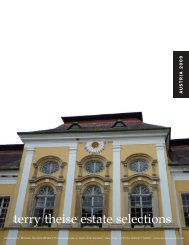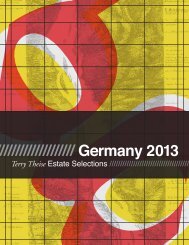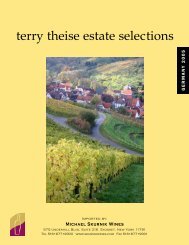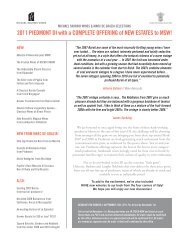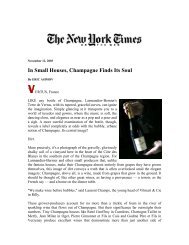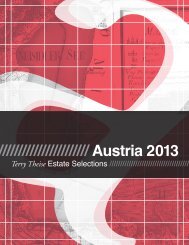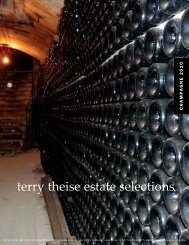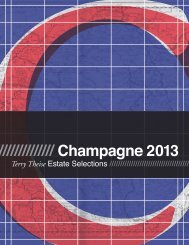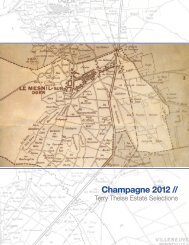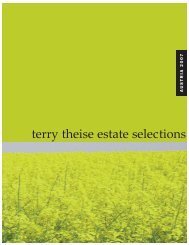German Catalog 2006 USE THIS ONE.qxp - Michael Skurnik Wines
German Catalog 2006 USE THIS ONE.qxp - Michael Skurnik Wines
German Catalog 2006 USE THIS ONE.qxp - Michael Skurnik Wines
Create successful ePaper yourself
Turn your PDF publications into a flip-book with our unique Google optimized e-Paper software.
the presence of spirit-of-place, then it’s there because we<br />
glean it, because we are not separate from the things we<br />
experience.<br />
I want to emphasize that point. The soul records,<br />
but does not transcribe. Because we are a part of<br />
nature, what happens to us also happens in nature. This<br />
is self-evident. From this point one ventures into cosmology<br />
or does not, according to one’s preferences. I<br />
prefer to believe spirit-of-place registers in our soul<br />
because nature wants it to. Because everything that happens<br />
in nature is part of a design, which we humans<br />
discern. You may believe or disbelieve in the purposiveness<br />
of that design. Myself, I feel if one chooses to<br />
presume there is no purpose, then what is there left to<br />
think about? It’s all senseless and random, la di da,<br />
what’s on TV? Assuming it is not mere chance is at the<br />
very least an opening for more thinking.<br />
How do we know when WINE is expressing spirit-of-place?<br />
We need some-thing tangible to grasp.<br />
Here it is: When something flourishes, it tells us it is at<br />
home. It says this is where I belong; I am happy here. I<br />
believe we taste “flourish” when a grape variety speaks<br />
with remarkable articulation, complexity and harmony<br />
in its wines. We know immediately. And the very best<br />
grapes are those persnickety about where they call<br />
home. Riesling seems content in <strong>German</strong>y, Alsace,<br />
Austria. It can “exist” elsewhere but not flourish. It<br />
likes a long, cool growing season and poor soils dense<br />
in mineral. Then it can rear back and wail!<br />
But the same grape will be mute on “foreign” soil.<br />
Try planting Riesling where it’s too warm or the soil’s<br />
too rich, and it becomes a blatant, fruit-salady wine<br />
which most people correctly write off as dull and cloying.<br />
Has Chenin Blanc ever made great wine outside<br />
Anjou or Touraine? Nebbiolo doesn’t seem to flourish<br />
outside Piemonte. I’d even argue that Chardonnay is<br />
strictly at home in Chablis and Champagne, since these<br />
are the only places where its inherent flavors are complex<br />
and interesting; it does easily without the pancake-makeup<br />
of oak or other manipulations.<br />
When a vine is at home it settles in and starts to<br />
transmit. We “hear” these transmissions as flavors. A<br />
naturally articulate grape like Riesling sends a clear<br />
message of the soil. And so we see the lovely phenomenon<br />
of detailed and distinct flavors coming from contiguous<br />
plots of land. Vineyard flavors are consistent,<br />
specific, and repeated year after year, varied only by<br />
the weather in which that year’s grapes ripened.<br />
If you’re a vintner with parcels in these sites, you<br />
know them as if they were your children. You don’t<br />
have to wait for the wine to see their distinctions; you<br />
can taste them in the must. You can taste them in the<br />
grapes.<br />
You wouldn’t have to sermonize to these people<br />
about spirit-of-place. They are steeped within that spirit<br />
as a condition of life. Their inchoate assumption that<br />
Place contains Spirit is part of that spirit.<br />
Let’s step back at little. The Mosel, that limpid little<br />
river, flows through a gorge it has created, amidst<br />
impossibly steep mountainsides. Its people are conservative<br />
and they approach the sweaty work on the steep<br />
slopes with humility and good cheer. They are people<br />
of the North, accustomed to a bracing and taut way of<br />
life. Is it an accident that their wines, too, are bracing<br />
and taut? Show me someone who is determined to<br />
prove otherwise, and I’ll show you someone who has<br />
never been there.<br />
I’ll go further. I believe the Catholic culture of the<br />
Mosel produces wines themselves catholically mystic.<br />
You see it in the wines when they are mature; sublime,<br />
uncanny flavors which seem to arise from a source notof-this-earth.<br />
I need wines which tell me in no uncertain terms:<br />
“I hail from <strong>THIS</strong> place and this place alone, not from<br />
any other place, only here, where I am at home.”<br />
Because such wines take us to those places. If we are<br />
already there, they cement the reality of our being<br />
there. We need to know where we are. If we do not, we<br />
are: lost.<br />
I don’t have time to waste on processed wines that<br />
taste like they could have come from anywhere,<br />
because in fact they come from nowhere and have no<br />
place to take me. We crave spirit of place because we<br />
need to be reassured we belong in the universe. And we<br />
want our bearings. We want to know where home is.<br />
We can deny or ignore this longing, but we will grow<br />
old wondering at the ceaseless scraping nail of anxiety<br />
that never lets us feel whole. Or we can claim this world<br />
of places.<br />
And when we do, we claim the love that lives in<br />
hills and vines, in trees and birds and smells, in buildings<br />
and ovens and human eyes, of everything in our<br />
world that makes itself at home and calls on us to do<br />
the same. The value of wine, beyond the sensual joy it<br />
gives us, lies in the things it tells us, not only its own<br />
hills and rivers, but the road home.<br />
151



